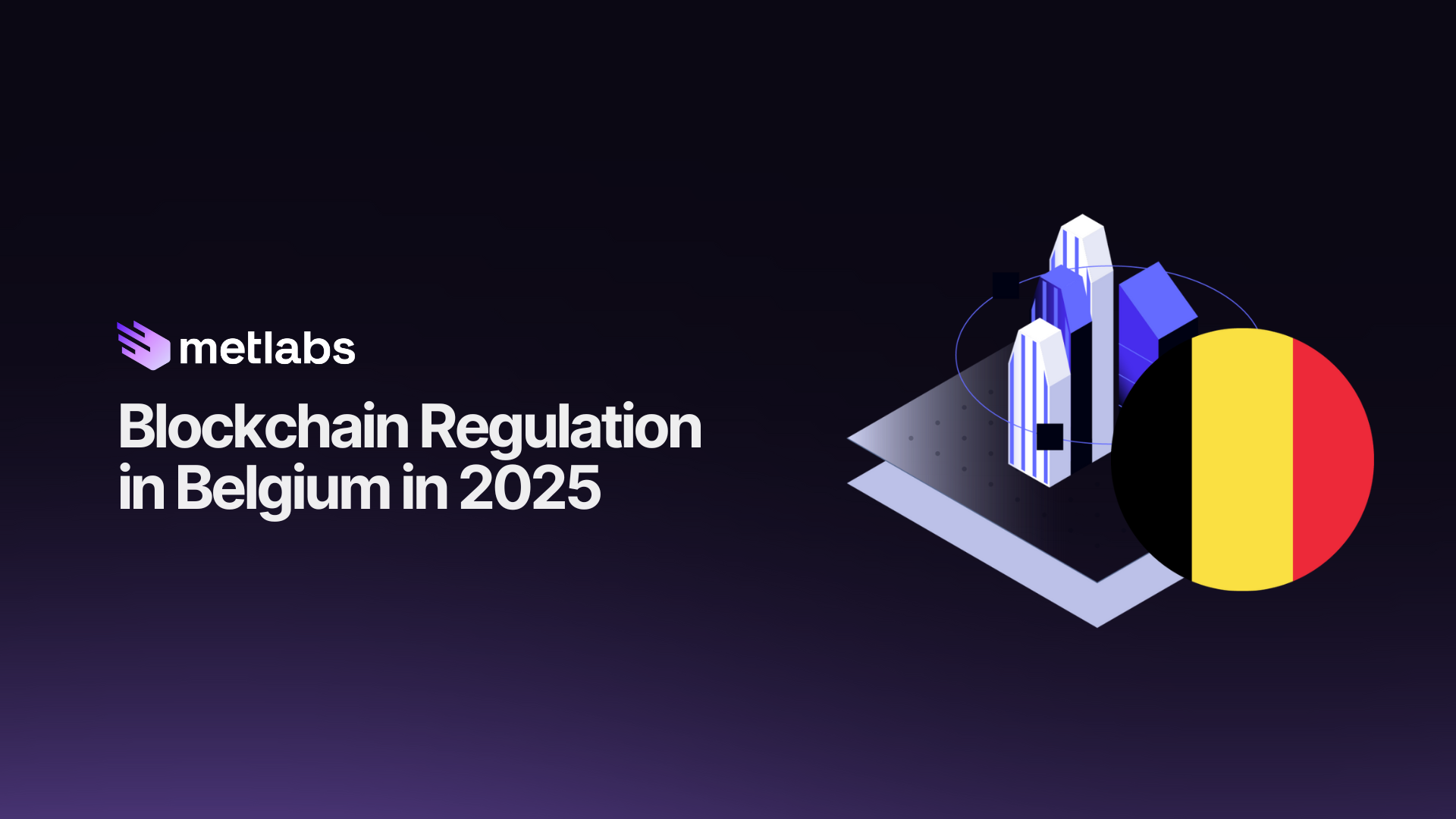The adoption of blockchain technology and asset tokenization is advancing at a rapid pace, but the real engine driving its global development is the existence of a clear, consistent and innovation-friendly legal framework.
Some countries have already established themselves as regulatory benchmarks, establishing specific rules for cryptoassets, DLT infrastructures and the issuance of legally backed tokens. In this article we show you the relevant information about blockchain regulation in Belgium, which you can use as a guide if you are looking to operate internationally or evaluate different strategic locations.

Current legislation on blockchain and virtual assets in Belgium.
MiCA Regulation (Markets in Crypto-Assets Regulation)
Establishes the EU’s first comprehensive legal framework for regulating cryptoasset issuers and service providers (CASPs). Covers stablecoins, utility tokens, electronic money tokens (EMTs), asset referenced tokens (ARTs), and custody or exchange platforms. Requires prior authorization, governance requirements, solvency, transparency, and user protection.
MiFID II (Markets in Financial Instruments Directive II)
European Directive that regulates the markets of traditional financial instruments and also applies to cryptoassets considered as financial instruments (e.g. security tokens). It establishes rules on transparency, investor protection, advisory services, order execution and prudential requirements for investment firms.
Prevention of Money Laundering Law (AMLD5)
Belgium has transposed the AMLD5 Directive, establishing obligations for cryptoasset service providers regarding the prevention of money laundering and terrorist financing. CASPs must register with the FSMA, implement KYC procedures and report suspicious activities to the Financial Intelligence Unit (CTIF-CFI).
Cryptoassets Sandbox and DLT Pilot Regime in Belgium
Belgium participates in European regulatory sandbox initiatives, such as the European Blockchain Sandbox Initiative (EBSI), which allows companies to test innovative solutions in a controlled environment. In addition, the country collaborates in the EU DLT Pilot Scheme, facilitating experimentation with market infrastructures based on distributed ledger technology.
Tokenization makes it possible to digitally represent real-world assets via blockchain, but for it to have legal value, a regulatory framework recognizing this operation is essential. Belgium adopts its own approach, establishing specific rules for the issuance, custody or trading of tokens. In this block we explain how asset tokenization is regulated from a legal point of view, taking an advanced jurisdiction such as Belgium as an example.
Regulation of asset tokenization in Belgium
Belgium allows the tokenization of both financial and non-financial assets, under European regulatory frameworks and specific local measures. In the case of financial assets such as stocks, bonds or fund shares, the Financial Services and Markets Authority (FSMA) strictly applies the MiFID II Directive, which implies requirements for prospectus, governance, registration systems and investor protection. These tokens must be traded on authorized platforms and follow the same principles as traditional instruments, ensuring regulatory equivalence. For the issuance of security tokens, moreover, additional rules may apply under the DLT Pilot Regulation, especially if you wish to operate secondary markets on blockchain-based infrastructures.
Regarding tokenized non-financial assets, Belgium has no specific legislation yet, but these projects are subject to case-by-case analysis, depending on the nature of the token and its function. Possible civil, tax and consumer obligations apply, in addition to the need to comply with MiCA if the token falls into one of its defined categories, such as utility tokens or ART.
In addition, Belgium actively participates in the EU DLT Pilot Regime, allowing certain tokenized infrastructures to operate with limited regulatory exemptions. It also collaborates in the European Blockchain Sandbox Initiative (EBSI), encouraging experimentation with distributed registries in sectors such as finance, healthcare or education.
Regulatory bodies and authorities for digital assets in Belgium
Financial Services and Markets Authority (FSMA)
The FSMA regulates and supervises financial markets in Belgium, including cryptoasset-related activity under the MiCA Regulation and the MiFID II Directive. It licenses cryptoasset service providers (CASPs), reviews token issuances and ensures investor protection. It also supervises advertising linked to digital products and combats misleading practices. It collaborates with ESMA and other European authorities on regulatory harmonization.
National Bank of Belgium (NBB)
The NBB plays key roles in financial stability, and works closely with the FSMA in the area of digital assets. It supervises issuers of stablecoins in terms of solvency, reserves and governance. He is also involved in assessing risks associated with new technologies such as blockchain, DeFi or payment tokens. His approach combines macroeconomic prudence with support for secure financial innovation.
Financial Intelligence Unit (CTIF-CFI)
The CTIF-CFI is the national agency for financial analysis and prevention of money laundering and terrorist financing. It has the power to receive, evaluate and report suspicious transactions, especially in the field of cryptoassets. All CASPs registered in Belgium must comply with reporting obligations to this unit. The CTIF-CFI cooperates with international networks such as Egmont Group and Europol to combat cross-border financial crime.
Launching a business based on digital assets requires more than just technology: it is also necessary to comply with legal requirements such as licensing, registration and regulatory obligations. These conditions ensure that the business model is viable and sustainable over time, and that it meets transparency and fraud prevention standards. In this section we explore which licenses are typically required and which compliance criteria blockchain companies operating in Belgium must follow.

What licenses and requirements are needed to trade cryptoassets in Belgium?
CASP License (MiCA)
CASP licensing is mandatory under the MiCA Regulation for exchanges, custodians and issuers of ART and EMT tokens operating in Belgium or the EU. The FSMA grants or denies prior administrative authorization for CASPs, after consultation and collaboration with the National Bank of Belgium, especially when dealing with issuers of stablecoins (electronic money tokens, EMT, and asset referenced tokens, ART), where the National Bank of Belgium assumes a specific supervisory role.
Investment Firm License (ESI)
If a Belgian platform offers crypto derivatives (such as futures, options, CFDs or other financial products whose underlying is a cryptocurrency), those products are considered financial instruments under European and Belgian law. Therefore, the trader needs an investment firm license under MiFID II to be able to offer them legally.
AML/KYC Compliance
All crypto companies in Belgium must comply with the Prevention of Money Laundering Act, which in Belgium is based on the transposition of Directive (EU) 2018/843 (AMLD5). This includes the implementation of KYC processes, transaction monitoring, identification of beneficial owners and suspicious activity reporting. The FSMA oversees compliance with these obligations as an essential condition for obtaining and maintaining licenses.
Other regulatory requirements
Crypto companies in Belgium must comply with the DORA Regulation, in addition to minimum capital requirements and annual technical audits. DORA requires ICT risk management systems, cybersecurity, business continuity and regular digital resilience testing. It also mandates oversight of external technology providers and staff training in digital security. Compliance with DORA is mandatory to maintain the MiCA license.
Are you exploring developing your blockchain project in Belgium?
At Metlabs we help companies like yours and offer comprehensive support in the development of blockchain projects and tokenization of assets such as real estate, carbon credits, commodities, intellectual property, financial instruments, franchises and more, fully aligned with the blockchain regulation in Belgium and international regulatory standards.
Contact us and find out how we can help you meeting all your business model needs, from technical validation and structuring to design, development and implementation of custom blockchain solutions, ready to scale from day one.



